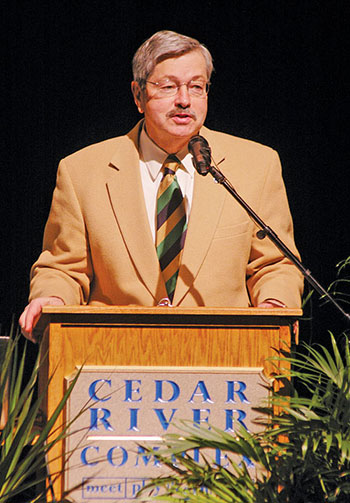Iowa Gov. Terry Branstad knows unfinished business when he sees it.
Elected four times to serve as governor from 1983 to 1999, Branstad left office 14 years ago as Iowa’s longest-serving chief executive.
He wasn’t done. Motivated to run for governor again in 2010, he entered the race and won election for the fifth time.
Now in his 19th year as the CEO of Iowa, Branstad is working on what may be the most ambitious agenda of his political life: creating 200,000 jobs for Iowans, raising personal income by 25 percent in five years, and improving the state’s business climate to make it one of the nation’s best.
“We have made great progress,” says Branstad. “We have the state’s financial house in order. Our jobless rate is less than 5 percent. And we are well on our way toward raising Iowans’ personal income by 25 percent over five years.”
He’s doing it through a series of legislative measures aimed at making Iowa a more competitive state for business, including lowering the corporate income tax and eliminating the tax on equipment and machinery.
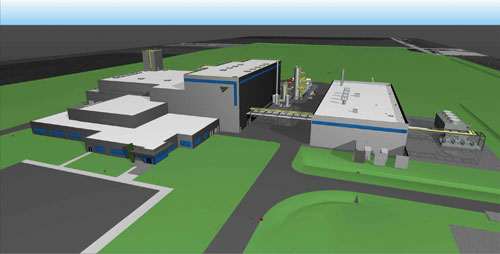
Digital rendering of the new Valent BioSciences manufacturing facility being constructed in Osage, Iowa.
He wants to do more. “From 2010 to 2011, Iowa had the third highest growth rate in per capita income in the U.S.,” the governor says. “Our exports are doing very well. Agriculture is one of the strong parts of our economy. We are adding value and not just shipping our corn and soy beans. Even cattle feeding is coming back in Iowa.”
Driven by increasing global demand for food and the recent discovery of large shale gas deposits in the Central U.S., Iowa is entering the golden era of value-added agricultural production.
Late last year, two of the world’s largest producers of nitrogen fertilizer — CF Industries and Orascom — announced unprecedented facility investments in Iowa. CF Industries, based in Deerfield, Ill., is building a $1.7-billion fertilizer plant expansion at its Port Neal Nitrogen Complex in Woodbury County, while Egypt-based Orascom is building a $1.4-billion fertilizer plant in Lee County.
The CF Industries investment in the Sioux City metro area is believed to be the largest capital investment in Iowa history. The project will create 100 new full-time jobs, plus another 2,000 construction jobs during the 24 months it will take to complete the expansion.

An aerial view of the corporate headquarters of the Principal Financial Group in downtown Des Moines, Iowa.
Photo courtesy of the Principal Financial Group
Iowa incentivized both deals at a level that was substantially more aggressive than previous administrations. The Iowa Economic Development Authority awarded CF Industries direct financial assistance of $1.5 million through its High Quality Jobs Program, along with $13 million in refundable sales tax credits and $9 million in investment tax credits. The IEDA board will also consider amendments to allocate an additional $12 million in investment tax credits in each of the next four fiscal years.
For Orascom in Wever, the IEDA approved a comprehensive financial incentive package that authorizes tax credits in the amount of $57 million and could include another $50 million of tax relief in the future.
Durham: Track Record Delivers
While some political opponents and some in the Iowa media have questioned the usefulness of large incentive packages and whether the payback from the companies who receive them is enough, a recent study by Deloitte Consulting concluded that Iowa should do even more to assist expanding companies.
“Iowa has a solid base of state-level economic development incentives tools upon which to build,” said Darin Buelow, a principal with Deloitte. “However, to become more competitive, Iowa may wish to increase the funding level and flexibility of some of the state’s key incentive programs.”
IEDA Director Debi Durham says the real winners from the state’s recent incentive awards are hard-working Iowans.
“Gov. Branstad is all about bringing jobs to Iowa and elevating GDP growth and per capita income growth,” Durham says. “He is moving projects through quickly. He meets personally with these companies, and thanks to him, Iowa is back in business again.”
Durham says the critics can’t quibble with the results. “It is a different day in Iowa right now,” she says. “We are at 4.9 percent unemployment, and our unemployment fund is one of a few in the country that has been solvent. We have a triple-A bond rating. The Wall Street Journal ranked us as one of the top five managed states in the country. We are not going to tap deeply into our reserves.”
More importantly, Durham says, the economic growth occurring in Iowa now is sustainable because it is happening in multiple industry sectors in every region of the state.
“The investments by CF Industries and Orascom may be the biggest news in Iowa right now, but we are also experiencing tremendous growth in the financial services sector, the energy sector, life sciences, data centers and the software/IT market,” she says. “Companies in a variety of sectors are finding the skill sets they need all across Iowa. For example, IBM in Dubuque continues to grow. They continue to bring in talent, and they are very pleased with their investment in Iowa.”
Michael B. Donaldson, president and CEO of Valent BioSciences Corp., says his Libertyville, Ill.-based company evaluated locations throughout the Midwest and Southeast before selecting Osage, Iowa, for a $150-million plant investment.
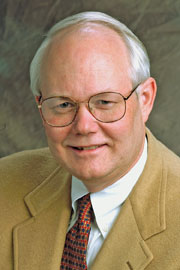
“We have excellent health care at lesser costs (in Des Moines) than we do at our other locations. The health-care issue is a hidden gem for Iowa.“
— Ralph Eucher, executive vice president of the Principal Financial Group
Located in Mitchell County in Northeast Iowa, the Valent facility will employ 90 workers upon its completion in June 2014.
“We are in the crop production side of the business,” says Donaldson. “We make products that are biologically oriented. We sell products in 92 countries and we have a very large footprint, so our manufacturing supply chain is extremely important.”
Osage made the most sense from a supply-chain standpoint because “we needed to be very close to our fermentation plant in Osage,” says Donaldson. “For over 30 years, we have had a relationship with our partner in Osage for packaging and distribution. Since our product is fermentation-based, it is critical that it be prepared quickly and efficiently for worldwide distribution.”
The second most important site selection factor was the overall business environment, says Donaldson. “We have been in business for over 40 years, and we wanted some place where we could be for the next 40 years,” he says. “We needed a state that would be very friendly to our business for the long haul. We needed permitting in a timely manner, and we needed cooperation. We needed support, not special treatment.”
Thirdly, notes Donaldson, “we needed labor options. This is a very high-tech facility that requires very high-skilled labor. The skill sets that were there in Iowa were very beneficial to us. Ethanol manufacturing is very similar to the type of manufacturing that we do relative to fermentation. In our experience in Osage, the work force of our partner has been very reliable.”
The final location factor came down to “the total operating cost of the plant,” Donaldson says. “We were looking at areas where the taxation of businesses was favorable for investment both now and in the future.”
Donaldson says Valent found everything it needed in Iowa. “Our ultimate decision was quite straightforward,” he says. “We considered sites in Illinois, Minnesota and Georgia. We even considered outsourcing some of this manufacturing work to China. From a logistics standpoint, it made more sense to pick Iowa.”
State support sealed the deal, he adds. “Gov. Branstad personally supported the project. He and I had several conversations about it,” Donaldson adds. “Being able to have direct contact with state officials is very important. I did not have that access any place else.”
Luring Future Knowledge Workers
For the Principal Financial Group in Des Moines, collaboration with state and local officials facilitated a $285-million corporate headquarters renovation deal that keeps the global financial services giant in Iowa for the long term.
“We had gone through between 18 and 24 months of study on the project,” says Ralph Eucher, executive vice president of PFG. “We basically asked, ‘What could our reinvestment in our Des Moines campus look like so that we could attract and retain the very best talent?’ This project is really about our ability to attract and retain the most talented knowledge workers possible. We have moved away from having a work force that was mostly transactional to one that is mostly comprised of knowledge workers.”
With more than 6,000 employees and 2.2 million sq. ft. of space already in Des Moines, PFG is poised to grow its Iowa work force even more over the next decade, says Eucher. “We are actually shrinking the square footage of the campus. We have excess capacity today,” he notes. “We will make our buildings operate more in the model that we need for knowledge workers.”
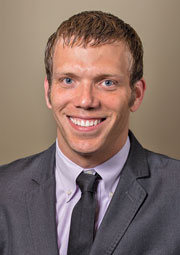
Eucher says assistance from IEDA and the Greater Des Moines Partnership made the deal possible. “They worked very closely with us,” he says. “They believe that our project will spur development around us in the Des Moines community.”
Eucher cites several factors as giving Iowa an edge. “We have excellent health care at lesser costs than we do at our other locations,” he says. “I benchmark that with our HR team. There is a real opportunity here for people to have very good schools, a very reasonable cost of living and a very high overall quality of life. The health-care issue is a hidden gem for Iowa.”
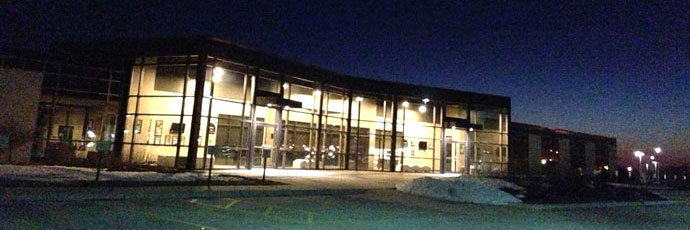
Wade Arnold is CEO of Banno in Cedar Falls, Iowa.
Photos courtesy of Banno
That is no accident, says Gov. Branstad. Iowa works hard to promote healthy lifestyles and health-conscious communities, he notes.
The Gallup-Healthways Well-Being Index recently ranked Iowa as the ninth-best state for overall well-being.
“Our goal is to be number one,” the governor says. “We started out being number 19 two years ago. We are up to nine now, and we feel very good about that. We have a great partnership with Wellmark and Healthways. We are also competing for more of our communities to be labeled as Blue Zone communities for overall health and wellness. I am trying to lead by example.”
Durham says Branstad excels at that, especially when it comes to “walking the talk” of economic development.
“The governor is pushing for property tax reform,” Durham says. “There is some momentum around it, so we expect it to pass. And he’s pushing educational reform that centers around work-force training. Iowa is transitioning to the middle-skilled to high-skilled jobs. We want to help people in the low-skilled jobs to get the training they need to upgrade their skills. NCRC [National Career Readiness Certificate] training is a program we are pursuing to help with this.”
Nobody knows the importance of having a trained work force more than Wade Arnold, CEO of Banno in Cedar Falls, Iowa.
“We are a software company, and we are adding 8,000 square feet so that we have more room to hire more graphic designers and more application developers in the Cedar Falls market,” Arnold says. “We have 64 employees now between Cedar Falls and Des Moines, and this expansion will allow us to go to about 90 employees.”
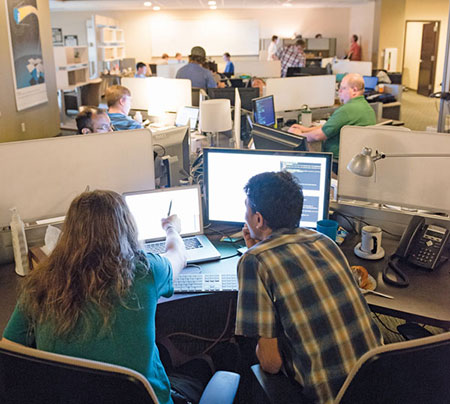
Banno regularly brings in dozens of interns from the University of Northern Iowa to work as software engineers in training at the firm that specializes in making mobile banking applications for small community banks and credit unions around the country.
Photo courtesy of Banno
Access to talent is what makes Banno thrive in Iowa, says Arnold. “Our tie to Cedar Falls is more in line with our tie to the University of Northern Iowa,” he says. “We will have 28 full-time, computer-science interns here. They can work here year-round after they go through the feeder program in the summer. In Des Moines, we have access to Iowa State University, and we can duplicate what we did with UNI. As people go through the internship program, they usually stay with us for a couple of years at least. By having an office in Des Moines, it gives us the ability to retain employees who may be looking to go to a larger market.”
Banno sells its products to more than 400 small community banks and credit unions. “We are their mobile banking solution for the iPhone and Android,” says Arnold. “The majority of our customers are outside of the state. They are all over the country.”
The computer-science skills that built Banno have a long history in Iowa, Arnold adds. “The computer was invented in Iowa. GPS was invented in Iowa,” he notes. “We are more than agriculture and advanced manufacturing. These high-wage software and computer engineering jobs are the types of jobs that we can grow right here in Iowa.”
Arnold says state support for ventures like Banno is growing as well. “What’s changing in Iowa is the political involvement,” he says. “The state of Iowa did a $3-million loan to us on a 3-percent interest rate for 10 years. It is a liquidity-type loan that enables us to do what we need to do to grow. That is evidence of the change in the state.”
The Ties that Bind Iowa, China
Evidence of Iowa’s progress in economic development comes in other forms too. For example, CNBC last year ranked Iowa as having the second lowest cost of doing business among all 50 U.S. states, while the Trade Information Service reported that Iowa manufacturing exports grew 179 percent from 2001 to 2011.
Education News notes that Iowa colleges and universities produce nearly 1,500 engineering graduates per year, while Iowa ranks among the nation’s top 10 states for overall quality of university research and development.
Despite the rapid progress in Iowa, Gov. Branstad is not content. That’s why he personally led a trade mission to China in mid-April.
“I have a personal relationship with the new president of China that goes back to 1985,” the governor says. “On April 29, 1985, I was the governor that invited a delegation from China to come to my office. He was the head of our sister state back then. He had such a fond memory of his visit that he told me many years later about the details of that trip. He now calls us old friends.”
Branstad led a delegation of 46 Iowans last month on visits to four cities in China and meetings with four provincial governors. “We will have more trade with China and more FDI from Chinese companies here in Iowa,” he says. “We have had two large Korean companies invest here, as well as major investments from firms in Japan and Europe. And then there was the huge investment from the company in Egypt [Orascom].”
The governor says he wants corporate executives in other locations to know that “we are open for business. If you bring your company here, you will find the friendliest and hardest working people here.”
This investment profile was prepared under the auspices of the Iowa Economic Development Authority. For more information in Iowa, contact Tina Hoffman of the IEDA at 515-725-3150 or by email at tina.hoffman@iowa.gov. On the web, go to www.iowaeconomicdevelopment.com.
